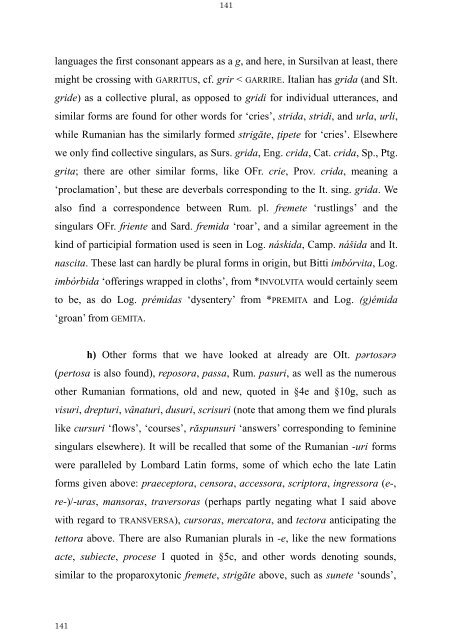The Latin Neuter Plurals in Romance - Page ON
The Latin Neuter Plurals in Romance - Page ON
The Latin Neuter Plurals in Romance - Page ON
You also want an ePaper? Increase the reach of your titles
YUMPU automatically turns print PDFs into web optimized ePapers that Google loves.
141<br />
141<br />
languages the first consonant appears as a g, and here, <strong>in</strong> Sursilvan at least, there<br />
might be cross<strong>in</strong>g with GARRITUS, cf. grir < GARRIRE. Italian has grida (and SIt.<br />
gride) as a collective plural, as opposed to gridi for <strong>in</strong>dividual utterances, and<br />
similar forms are found for other words for ‘cries’, strida, stridi, and urla, urli,<br />
while Rumanian has the similarly formed strigăte, Ńipete for ‘cries’. Elsewhere<br />
we only f<strong>in</strong>d collective s<strong>in</strong>gulars, as Surs. grida, Eng. crida, Cat. crida, Sp., Ptg.<br />
grita; there are other similar forms, like OFr. crie, Prov. crida, mean<strong>in</strong>g a<br />
‘proclamation’, but these are deverbals correspond<strong>in</strong>g to the It. s<strong>in</strong>g. grida. We<br />
also f<strong>in</strong>d a correspondence between Rum. pl. fremete ‘rustl<strong>in</strong>gs’ and the<br />
s<strong>in</strong>gulars OFr. friente and Sard. fremida ‘roar’, and a similar agreement <strong>in</strong> the<br />
k<strong>in</strong>d of participial formation used is seen <strong>in</strong> Log. náskida, Camp. nášida and It.<br />
nascita. <strong>The</strong>se last can hardly be plural forms <strong>in</strong> orig<strong>in</strong>, but Bitti imbórvita, Log.<br />
imbórbida ‘offer<strong>in</strong>gs wrapped <strong>in</strong> cloths’, from *INVOLVITA would certa<strong>in</strong>ly seem<br />
to be, as do Log. prémidas ‘dysentery’ from *PREMITA and Log. (g)émida<br />
‘groan’ from GEMITA.<br />
h) Other forms that we have looked at already are OIt. pərtosərə<br />
(pertosa is also found), reposora, passa, Rum. pasuri, as well as the numerous<br />
other Rumanian formations, old and new, quoted <strong>in</strong> §4e and §10g, such as<br />
visuri, drepturi, vânaturi, dusuri, scrisuri (note that among them we f<strong>in</strong>d plurals<br />
like cursuri ‘flows’, ‘courses’, răspunsuri ‘answers’ correspond<strong>in</strong>g to fem<strong>in</strong><strong>in</strong>e<br />
s<strong>in</strong>gulars elsewhere). It will be recalled that some of the Rumanian -uri forms<br />
were paralleled by Lombard <strong>Lat<strong>in</strong></strong> forms, some of which echo the late <strong>Lat<strong>in</strong></strong><br />
forms given above: praeceptora, censora, accessora, scriptora, <strong>in</strong>gressora (e-,<br />
re-)/-uras, mansoras, traversoras (perhaps partly negat<strong>in</strong>g what I said above<br />
with regard to TRANSVERSA), cursoras, mercatora, and tectora anticipat<strong>in</strong>g the<br />
tettora above. <strong>The</strong>re are also Rumanian plurals <strong>in</strong> -e, like the new formations<br />
acte, subiecte, procese I quoted <strong>in</strong> §5c, and other words denot<strong>in</strong>g sounds,<br />
similar to the proparoxytonic fremete, strigăte above, such as sunete ‘sounds’,









